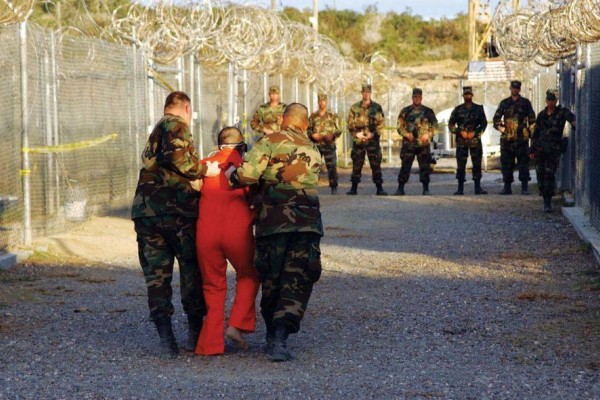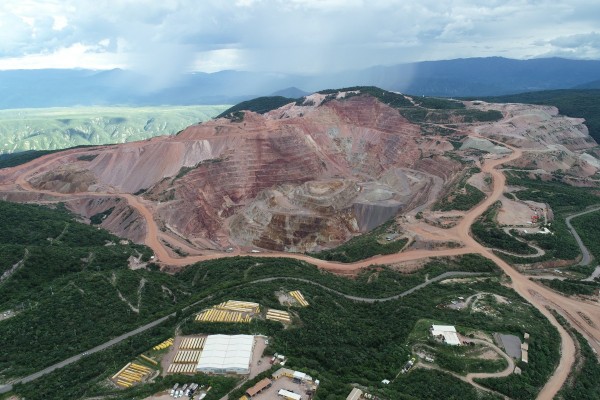“War on Terror” Has Latin America Indigenous People in its Sights
The “War on Terror,” identified in Amnesty International’s 2004 annual report as a new source of human-rights abuses, is threatening to expand to Latin America, targeting indigenous movements that are demanding autonomy and protesting free-market policies and “neoliberal” globalization.
In the United States, “there is a perception of indigenous activists as destabilizing elements and terrorists,” and their demands and activism have begun to be cast in a criminal light, said lawyer José Aylwin, of the Institute of Indigenous Studies at the University of the Border in Temuco (670 kilometres south of the Chilean capital).
Pedro Cayuqueo, director of the Mapuche newspaper Azkintuwe, also from the city of Temuco, wrote that the growing indigenous activism in Latin America and Islamic radicalism are both depicted as threats to America’s security and hegemony in a U.S. National Intelligence Council (NIC) study entitled Global Trends 2020–Mapping the Global Future.
Cayuqueo described the report as “a veritable x-ray” of potential “counter-insurgency scenarios” from now to the year 2020.
The reporter said the emergence of increasingly organized indigenous movements become, in that view, targets of “the so-called low-intensity warfare doctrine, a renovated version of the National Security Doctrine” that formed the basis of U.S. interventionism in Latin America from the 1960s to the end of the Cold War in the early 1990s.
The indigenous question would thus appear to form part of what the United States sees as a future threat to its hegemony.
In Latin America, the Andean sub-region is seen as the “hottest” area, because of the growing political role played by well-organized indigenous movements in Bolivia and Ecuador, but also because of the impact on indigenous peoples of armed conflict and drug trafficking in Colombia.
Farther south in the Andes Mountains, Mapuche organizations in southern Chile and Argentina have become more radical in recent years in their claims to their ancestral territory, demands for autonomy and the creation of indigenous reserves, and defense of the environment, which is threatened by transnational mining and forestry corporations granted tax breaks and other incentives by governments. Bolivia: “A Profound Democratic Essence”
“The indigenous nations exercise and preserve a profound democratic essence in their organizational and decision-making structures,” said Bolivian indigenous Aymara leader Juan de la Cruz Vilca. “But transnational corporations foment their exclusion from society and push indigenous people to violence, which could translate into armed struggle.”
In Bolivia, 70 per cent of the population of 9.2 million identifies itself as indigenous, and the indigenous movement, with other sectors, is demanding a constituent assembly to rewrite the constitution and “re-found the republic” to grant self-determination to the country’s 36 native groups, added de la Cruz Vilca. The activist, the former president of Bolivia’s Confederación Sindical Unica de Trabajadores Campesinos de Bolivia, a peasant farmer union, accused foreign oil companies of backing the demands for regional autonomy put forth by business and large landowners in the wealthy eastern regions of Santa Cruz, Tarija, Pando and Beni, where the country’s natural-gas reserves are concentrated.
“Behind that movement lies a hidden plan aimed at generating a violent reaction by the indigenous movements, in order to justify external military intervention,” he maintained.
“It’s true that indigenous peoples are a threat, from the point of view of the political and economic powers-that-be. They see us as terrorists, but we aren’t, because our struggle is open, legal and legitimate,” said Ricardo Díaz, an indigenous lawmaker with the leftist Movement Towards Socialism (MAS), the strongest opposition party in Bolivia.
Ecuador: “Breeding Ground”?
In Ecuador, indigenous people account for an estimated 40 per cent of the population of nearly 13 million. For the first seven months of the government of Lucio Gutiérrez, who was removed from his post by Congress on April 20 after a week of protests, the Pachakutik Movement, the political arm of the powerful Confederation of Indigenous Nationalities of Ecuador (CONAIE), formed part of the administration.
CONAIE president Luis Macas said that, if his movement, “which guides the indigenous struggle along peaceful channels, didn’t exist, the poverty in which our communities, and the Ecuadorian people in general, are steeped could become a breeding-ground for the emergence of organizations that could try to change the social situation through violence. But that hasn’t happened.”
Colombia: “A Black Cloud Hanging…”
“We are not a threat to the world, or to the United States. On the contrary, we hold out a hope, an alternative for humanity,” said Feliciano Valencia, coordinator of human rights for the Association of Indigenous Councils of Northern Cauca, in the southwestern Colombian province of Cauca.
The shamans (traditional healers) “had warned that very difficult times lay ahead, with a black cloud hanging over our territories,” the Nasa indigenous leader commented, saying the Colombian government was already following policies aimed at the persecution of social and indigenous movements even before the GlobalTrends 2020 report was issued.
The Nasa people number around 150,000, making them the second-largest indigenous group in Colombia, which is home to 90 Aboriginal communities that make up around two per cent of the population of 44 million. Although Colombia’s 1991 constitution granted autonomy to indigenous peoples in their reserves, that provision is not respected, and there are continuous occupations of land by the military and irregular armed groups, said Valencia.
He also protested the spraying of coca and poppy crops and the displacement of indigenous peoples from their land by those interested in getting their hands on natural resources.
Chile: “Legitimate Demands” Distorted
José Santos Millao, one of the Mapuche members of Chile’s National Corporation of Indigenous Development, remarked that the U.S. intelligence services “suspiciously or stupidly” cast the protests of indigenous peoples as part of “terrorist” tendencies in order to distort their “legitimate demands.” In Chile, 6.4 per cent of the population of 15.2 million identify themselves as indigenous members of six ethnic groups, although other estimates put the proportion at 10 per cent.
Argentina: “Internal Security” Problems
In neighboring Argentina, meanwhile, native peoples make up between 1.5 and 2.0 million people, out of a population of 37 million. In both Chile and Argentina, the Mapuches comprise the biggest indigenous group. The land conflicts that are currently raging began with the arrival of the foreign mining, oil, forestry and water companies, Mauro Millán, leader of the Mapuche Tehuelche Organization of Argentina, said. “The United States is trying to depict the reaction of the Mapuche people in defense of their land as an internal security problem facing our countries,” he said.
Rafael González, spokesman for the Committee of Campesino Unity in Guatemala, said that “since the September 11 terror attacks, anyone who criticizes the establishment is dubbed a terrorist” by the U.S. government.
Brazil: No Destabilizing Effect
In Brazil, where 400,000 indigenous people represent 0.2 per cent of the population, it is absurd to say their demands and protests have a destabilizing effect, said Jairo da Silva, deputy coordinator of the indigenous council of the northern state of Roraima, and Paulo Maldós, a political adviser to the Missionary Indigenist Council, which has ties to the Catholic Church.
Maldós commented that Latin America’s indigenous people are in the midst of an “ethnic reconstruction,” which explains why the declining workers’ movement has been increasingly eclipsed by associations of rural workers and peasant farmers.
He cited the case of Bolivia, where miners, previously linked by a powerful, well-organized labour union, have been overshadowed by coca farmers.
With respect to ethnic diversity, “the real destabilizing factor is the narrow-minded attitude of some states, like the Chilean state, which refuse to recognize the country’s multi-ethnic nature and to design mechanisms that permit it to be expressed,” said lawyer Aylwin.
“A state that recognizes that multi-ethnic nature and establishes political and territorial rights for indigenous people to allow them to develop within their own cultures has much fewer problems in terms of stability than states which deny that reality,” he argued.
Gustavo González is a writer with Inter Press Service News Agency.
This article appeared in the July/August 2005 issue of Canadian Dimension .










